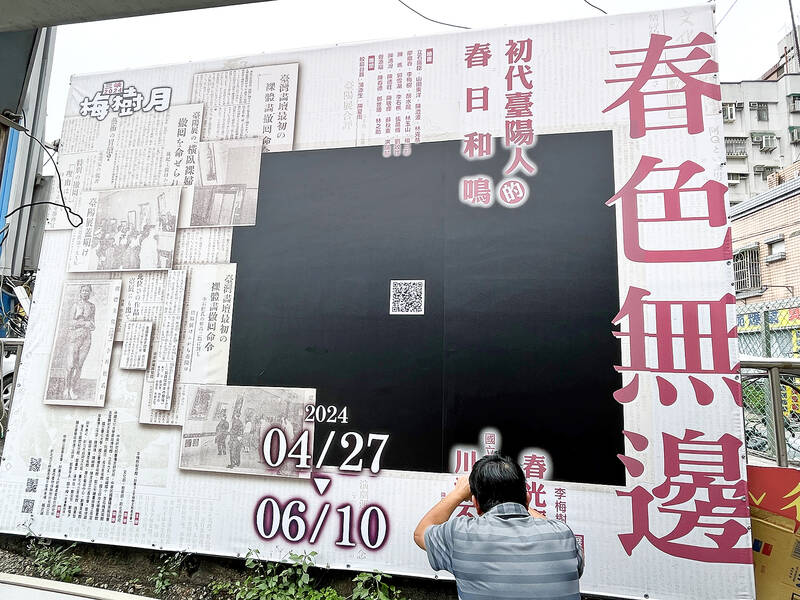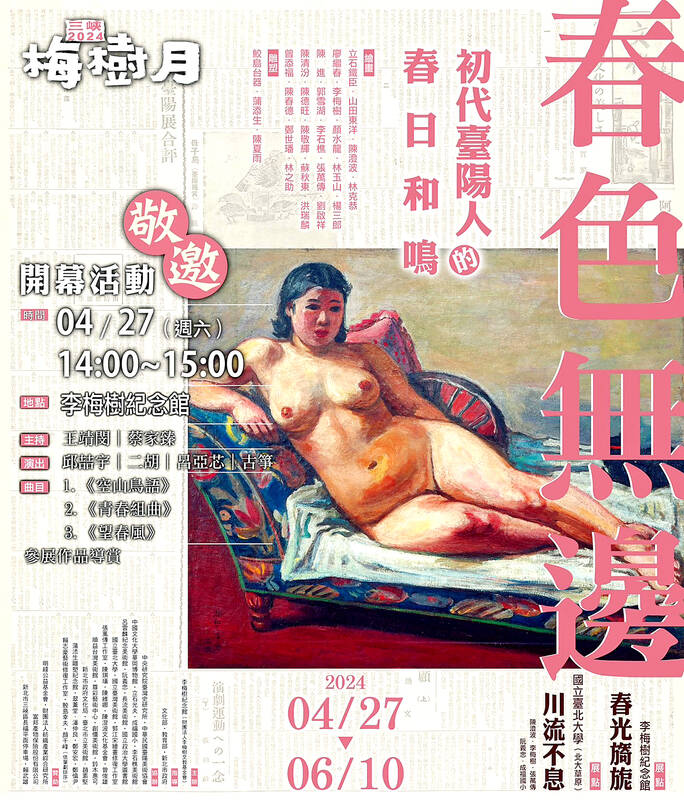A billboard put up by the Li Mei-shu Art Gallery featuring a female nude painting by late artist Lee Shih-chiao (李石樵) was partially censored yesterday following complaints from the parents of students at a nearby elementary school.
The gallery put a QR code on the blacked-out portion alongside a printed copy of a newspaper cutting of a story about how the painting was ordered to be pulled from the exhibit in 1936, to symbolize its stance of making a silent protest.
The gallery, in New Taipei City’s Sansia District (三峽), put up the billboard featuring Lee’s 1936 painting Reclining Nude (橫臥裸婦) in a parking lot last week to advertise its latest exhibition, which commemorates the 90th anniversary of the Tai-Yang Art Association.

Photo: Tung Kuan-yi, Taipei Times
However, complaints followed, with many coming from parents of students at the neighboring Anxi Elementary School.
The QR code links to a statement the gallery put up on Tuesday which said that the exhibit observes the founding principles of the Tai-Yang Art Association, adding that it hoped to provide artists with a platform to present their work and popularize art appreciation.
Lee was part of the group of seven artists who founded the association in 1934, with the goal of developing modern art education in Taiwan.

Photo courtesy of Lee Ching-wen
The statement said that the greatest principle underpinning the association, which also ran private art exhibitions from 1938 to 1944, and resumed in 1948, encouraged artists to express sentiments of loving and cherishing the place where the artist and the audience were raised, with art as the medium.
Lee’s Reclining Nude was also banned from being displayed at the association’s second fine arts exhibition in 1936, the year it was painted, by the Japanese colonial authorities after it was deemed “damaging to public morals.”
The name of the latest exhibition is “Chun se wu bian” (春色無邊), which can be translated as “The boundless colors of spring.”
In Chinese, the word chun se can also have a sexual connotation.
The museum said it chose the name well in advance, and only confirmed it would receive the painting on loan a month before the exhibition opened.
The statement said it arrived at the exhibit’s naming scheme based on two concepts: the first because the Tai-Yang Exhibit was always held in spring, and Li was also born in spring, so the exhibit wished to gather an array of pieces that would highlight Taiwan’s spring; the latter, wubian, meaning boundless, symbolizes artists’ eternal endeavor to achieve the three transcendentals — truth, goodness and beauty.
There is nothing sexual about the exhibition, the statement added.
Gallery foundation chief executive officer Lee Ching-wen (李景文) said the gallery did not wish to cause trouble and acquiesced to the demands.
However, he added that that he hoped those who complained would visit the exhibition to see for themselves what it is about.
While Anxi Elementary School called for the painting to be removed or censored, Chengfu Elementary School, another local elementary school, had a drastically different reaction.
The school’s principal, Hsieh Chi-huang (謝基煌), an art major, said yesterday the incident was an excellent opportunity to teach students how to approach nudity and art.
Senior school authorities explained to students during morning assembly why nudity was prevalent in Western paintings and sculptures, and how students should approach and appreciate the concept.
Hsieh said students were receptive after the explanation, and parents were also understanding.
Asked about the controversy, Beatrice Hsieh (謝佩霓), a curator and art critic, on Monday said that people should be able to distinguish between works of art and pornography, based on the professionalism of the artist.
Hsieh said she was nevertheless shocked that an 88-year-old painting, which “has already entered the public domain and become a part of Taiwanese history,” had caused such a stir.
“If even a piece by an iconic artist like this is questioned, what room does that leave for creativity?” she asked.

A year-long renovation of Taipei’s Bangka Park (艋舺公園) began yesterday, as city workers fenced off the site and cleared out belongings left by homeless residents who had been living there. Despite protests from displaced residents, a city official defended the government’s relocation efforts, saying transitional housing has been offered. The renovation of the park in Taipei’s Wanhua District (萬華), near Longshan Temple (龍山寺), began at 9am yesterday, as about 20 homeless people packed their belongings and left after being asked to move by city personnel. Among them was a 90-year-old woman surnamed Wang (王), who last week said that she had no plans

China might accelerate its strategic actions toward Taiwan, the South China Sea and across the first island chain, after the US officially entered a military conflict with Iran, as Beijing would perceive Washington as incapable of fighting a two-front war, a military expert said yesterday. The US’ ongoing conflict with Iran is not merely an act of retaliation or a “delaying tactic,” but a strategic military campaign aimed at dismantling Tehran’s nuclear capabilities and reshaping the regional order in the Middle East, said National Defense University distinguished adjunct lecturer Holmes Liao (廖宏祥), former McDonnell Douglas Aerospace representative in Taiwan. If

TO BE APPEALED: The environment ministry said coal reduction goals had to be reached within two months, which was against the principle of legitimate expectation The Taipei High Administrative Court on Thursday ruled in favor of the Taichung Environmental Protection Bureau in its administrative litigation against the Ministry of Environment for the rescission of a NT$18 million fine (US$609,570) imposed by the bureau on the Taichung Power Plant in 2019 for alleged excess coal power generation. The bureau in November 2019 revised what it said was a “slip of the pen” in the text of the operating permit granted to the plant — which is run by Taiwan Power Co (Taipower) — in October 2017. The permit originally read: “reduce coal use by 40 percent from Jan.

‘SPEY’ REACTION: Beijing said its Eastern Theater Command ‘organized troops to monitor and guard the entire process’ of a Taiwan Strait transit China sent 74 warplanes toward Taiwan between late Thursday and early yesterday, 61 of which crossed the median line in the Taiwan Strait. It was not clear why so many planes were scrambled, said the Ministry of National Defense, which tabulated the flights. The aircraft were sent in two separate tranches, the ministry said. The Ministry of Foreign Affairs on Thursday “confirmed and welcomed” a transit by the British Royal Navy’s HMS Spey, a River-class offshore patrol vessel, through the Taiwan Strait a day earlier. The ship’s transit “once again [reaffirmed the Strait’s] status as international waters,” the foreign ministry said. “Such transits by